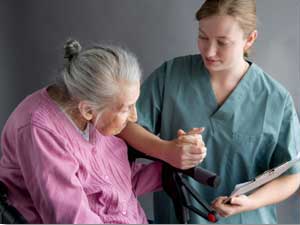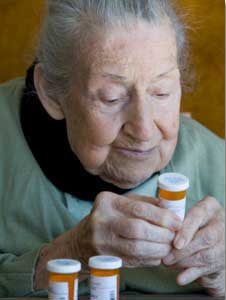
- Delirium is common in older people.
- Delirium has the following characteristics:
- sudden onset and fluctuating course of confusion
- inattention
- disorganized thinking
- altered level of consciousness
- Delirium and dementia both present as confusion but they are different illnesses.
- There are many causes of delirium.
- Delirium is a medical emergency.

- Delirium is quite common in older adults, affecting nearly one-third of those admitted to hospital.
- Sometimes delirium accompanies a physical illness like pneumonia or a stroke. Other times, it is the first warning of medical illness.
- Regardless of its cause, delirium is a serious medical condition – early recognition and treatment is essential.
- Delirium duration may range from a short episode to a few days (and even a few weeks or months), depending on the cause.
Characteristics of Delirium
 Delirium has the following features:
Delirium has the following features:
- Acute onset and fluctuations – Confusion usually develops suddenly and progresses over the next few hours or days. The confusion fluctuates and there may be periods of agitation and restlessness.
- Impaired attention – The person has difficulty concentrating on conversation and with familiar tasks. They get easily distracted and have difficulty following simple commands,
- Disorganized thinking – They may not know what day it is, where they are, or even who they are. Thinking is confused. Speech may be rambling or jumbled. Unusual suspicions, paranoia, or hallucinations may occur.
- Changes in level of consciousness:
- In hyperactive delirium, the person is agitated, with mood swings, at times angry, belligerent, and aggressive towards caregivers. For example, after surgery, they may try to climb out of bed, yell at caregivers, or pull out catheters and IV lines.
- In hypoactive delirium, there is extreme drowsiness, fatigue, and lethargy. These episodes may be misinterpreted as the person “just being ill and resting.”
Risk Factors
Individuals with the following characteristics are the most likely to have delirium:
- advanced age
- cognitive impairment or dementia (older people with dementia are especially susceptible to delirium)
- history of previous episodes of delirium
- multiple medical conditions
- multiple medications
- severe stress (from events like a move to a new environment, recent surgery or recent injury)
- sensory deprivation; hearing and visual impairment
Dementia and Delirium
Dementia and delirium share some common features and it is important to tell them apart.Dementia is a chronic, slowly progressing loss of memory and function. On the other hand, delirium develops quickly. It is a warning of a serious underlying medical condition.
Differences Between Dementia and Delirium
|
Dementia |
Delirium |
|
|
Onset |
slow onset over months or years |
sudden onset over hours or days |
|
Course |
progressive |
fluctuating |
|
Speech |
normal |
rambling |
|
Attention |
normal |
inattentive, easily distracted |
|
Memory |
gradual and progressive memory loss |
variable |
|
Hallucinations |
possible |
Common especially visual |
|
Level of consciousness |
normal |
impaired |
|
General health |
usual |
signs of illness or drug side effects |
Causes of Delirium
Many medical conditions and other problems can lead to delirium. Remember this helpful hint – the letters in the word "DELIRIUM" stand for the common reasons for this condition.
|
Drugs |
many medications, recently started or stopped, changes in dosages, over-the-counter medications, herbals, alcohol |
|
Electrolyte imbalance |
especially from dehydration |
|
Lack of drugs |
stopping certain medications, alcohol withdrawal |
|
Infection |
such as urinary or respiratory tract infections; blood or wound infection after an injury or surgery |
|
Reduced sensory input |
such as poor or uncorrected vision and hearing |
|
Intracranial |
such as from a stroke |
|
Urinary or fecal problems |
such as inability to empty bladder or bowel |
|
Myocardial (heart) and lungs |
heart attack, pneumonia, or other condition causing lack of oxygen in the blood and the brain |
Medical Attention Is Always Needed in Delirium
Early detection and treatment is essential because delirium is a sign of a serious underlying medical condition. In addition, older people with delirium are susceptible to injuries, falls, dehydration, pressure sores, and malnutrition.
Delirium
is a medical emergency. Accompany the person with delirium to the emergency department, and be ready to provide information on:
- past medical problems
- current medication list
- cognitive history
- details of everyday functioning and thinking before the confusion
While the content of each Caregiver College Topic may be linked to a variety of other Topic areas, the following has been identified as a Key Linkage which you may be interested in also reviewing:
- Treatment for Delirium
- Managing after Surgery
- Confusion, Memory Loss, and Altered Alertness
- Merck Manuals provides information about delirium, including its causes, symptoms, treatment and diagnosis. It also contains tables to assist you in comparing delirium with dementia and psychosis.